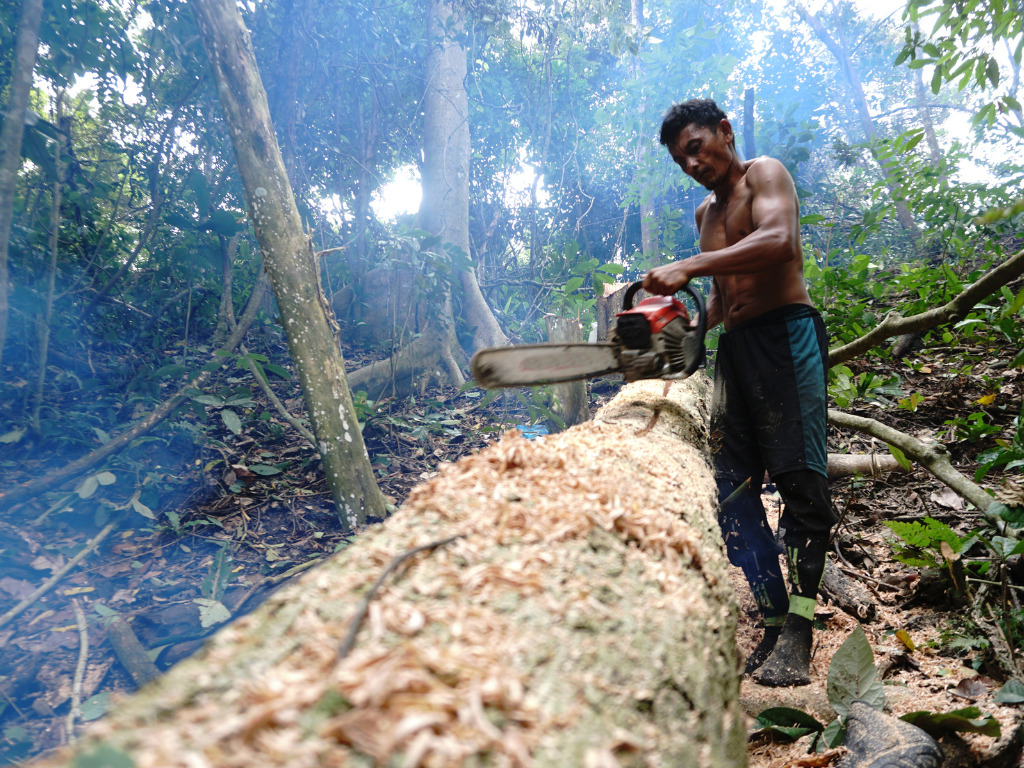An Open Letter To The WSJ: Indonesia’s Deforestation Policies Are Far From A Model Of Success
4 Mins Read
While it’s true that forest destruction in Indonesia is at its lowest pace in twenty years, deforestation policies in Indonesia are anything but a model of success.
I wrote this response to the Wall Street Journal article, “Indonesia Shows It’s Possible to Tame Rainforest Destruction.”
With all due respect to Jon Emont and The Wall Street Journal, while it’s true that forest destruction in Indonesia is at its lowest pace in twenty years, deforestation policies in Indonesia are anything but a model of success.
There is no denying the tremendous losses this region has suffered in terms of habitat and biodiversity destruction caused by the clearing of natural forests. However, the issues go far beyond what can be seen on the surface and the article doesn’t thoroughly reflect their effects on the ecosystem and livelihoods in the region.
Indonesia remains one of the world’s largest carbon emitters, with much of its pollution coming from deforestation and peatland clearances by the illegal mega-fires cited in the article. Emont is right that as forests are cleared to make way for industrial ventures and the production of agricultural commodities like palm oil, massive amounts of carbon dioxide and other harmful pollutants are released into the atmosphere. However, despite the articles’ claims, in 2021 Indonesia lost over 200,000 hectares of primary forest. According to the NGO Global Forest Watch, the new forest loss in Indonesia was within areas that Indonesia classifies as secondary forests and thus outside forests that Indonesia classifies as primary. Forest-clearing mega-fires continue to destroy irreplaceable biodiversity and contribute to climate change, which carries a heavy burden on the population of the region and the world.
Emont also mentions that the palm oil industry has stopped opposing deforestation efforts, but that is not quite accurate. The Indonesian government continues to be a vocal opponent of new deforestation efforts. Just look at their opposition to the new EU Deforestation regulations. The country argued that it would put an undue burden on smallholder farmers, but backed off that position in the face of the support of the Indonesian palm oil smallholders union. The country is also openly angered by the new rules and even sent envoys to the EU to defend its policies. Since then the country has continued to resist the new measures by imposing export bans and pledging to fight.
But opposition may not even be necessary because it is also well known that the palm oil industry has various ways to get around no-deforestation pledges. First, mass balance sourcing allows certified and non-certified ingredients to be mixed during shipping and manufacturing. Even palm oil producers working with third-party verifiers like the Rainforest Alliance and RSPO can use mass balance sourcing for palm oil. Although many major consumer brands using mass balance claim that the palm oil used in their products supports the production of certified palm oil, many others, like Kellogg’s, have openly stated that “in the absence of complete, verifiable traceability from suppliers and due to the use of RSPO schemes such as mass balance and credits” they are unable to pinpoint which palm oil mill or plantation their palm materials come from.
Moreover, by sourcing palm oil from conglomerates with logging and mining assets, corporate buyers can circumvent zero-deforestation policies by buying from companies that cut down trees in other sectors. Many – the majority, in fact – of the largest Indonesian palm oil operators also have mining or timber interests and most no-deforestation commitments only apply to the palm oil supply chain rather than the entire corporate entity. Even the new EU deforestation law allows cross-commodity deforestation.
Finally, while the decrease in deforestation may be confirmed today, deforestation activity can be easily reversed. Just this week, two more palm oil giants quit the no-deforestation High Carbon Stock Approach (HCSA) initiative. With four of the largest palm oil producers – including Wilmer – now withdrawn from the HCSA, it seems clear that palm oil companies are weakening – not strengthening – their sustainability pledges.
Is it possible that media coverage like this has given palm oil producers breathing room and they are using the good press as a signal they can relax their standards? I fear that this new industry narrative will result in further transgressions and backsliding as well as neglect by the very same policymakers, businesses, and environmentalists that pushed for progress in the first place.
There is no doubt that Indonesia has made progress, but the facts signal that the palm oil industry cannot be trusted to maintain voluntary initiatives to curb deforestation. Sustainable development requires a careful balance between preserving nature and using resources to enable economic development. To truly address the costs of large-scale deforestation, Indonesia should codify deforestation policies into law, support international deforestation efforts, and focus on promoting and enforcing existing regulations to protect its forests. Indonesia must recognize the long-term harms of palm oil production and take actionable steps to protect the environment, its citizens and the world.
This article was previously published on Substack.



